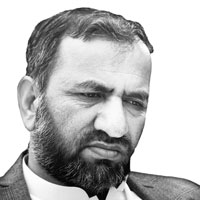As the battle for the future of Libya continues, the excitement is almost palpable among Libyan-born al Qaeda fighters and other Arabs hunkered down in Pakistan's remote and lawless tribal area. According to Afghan Taliban sources close to Osama bin Laden's terrorist group, some of the 200 or so Libyans operating near the Afghan border may be on their way home to steer the anti-Gaddafi revolution in a more Islamist direction.

"We have heard a number of fighters have already departed from the tribal area," says an Afghan commander who is linked to the powerful Haqqani network, a North Waziristan-based organization that shelters many al Qaeda fighters. Others may be on their way. "Libyans and Arabs seem to be getting ready for departure and are eager to go home and fight," says the Afghan source. "I've heard that some fighters are saying goodbye and giving thanks with kind words to their (Pakistani) tribal friends who have been sheltering them."
Since the anti-Gaddafi revolution began last month, al Qaeda—especially Libyan-born affiliates—have viewed the fighting as an opportunity to spread their radical Islamist ideology. Indeed, as one Afghan Taliban operative who helps facilitate the movement of al Qaeda militants between the tribal area and Pakistani cities told The Daily Beast earlier this month: "This rebellion is the fresh breeze they've been waiting years for. They realize that if they don't use this opportunity, it could be the end of their chances to turn Libya toward a real Islamic state, as Afghanistan once was."
If Yahya is successful in reaching rebel-held territory inside Libya, at least he'll be able to operate with relative freedom, without worrying about Gaddafi's secret police.
Now, as the White House and NATO continue to debate the possible ramifications of arming the Libyan opposition, the Haqqani network-linked Afghan commander says Libyan al Qaeda affiliates seem to be more "enthusiastic" about the war against Gaddafi every day. And from what the Afghan Taliban commander has seen, there appears to be more than " flickers" of al Qaeda's presence in Libya, the description given by NATO commander Admiral James Stavridis. According to the Afghan commander, al Qaeda fighters can't believe their good luck that U.S. and NATO aircraft—the same forces that have dropped bombs on their heads in Afghanistan and Pakistan—are now raining down ordnance against Gaddafi.
So far, Muammar Gaddafi's clumsy efforts to blame al Qaeda for the popular uprising against his dictatorship would be a joke, if only he weren't using that claim as an excuse for mowing down so many Libyans. In fact, it's been many years since Libya has seen significant numbers of radical Islamists—or any other organized opposition, for that matter. Nearly all have been killed, locked up or chased into exile years ago by the regime's secret police and security forces. Although the country's most feared insurgent entity, the al Qaeda-affiliated Libyan Islamic Fighting Group (known in Arabic as Al-Jama'a al-Islamiyah al-Muqatilah bi-Libya), has been seeking to topple Gaddafi since the early 1990s, and up until now, it's been unlikely that more than a handful who pledge allegiance to Osama bin Laden remain inside the country.
Today, along the tribal border region, al Qaeda's thirst for more immediate news has led even top leaders like Abu Yahya al-Libi, a Libyan who serves as the movement's senior Islamist ideologue and bin Laden's head of operations for Afghanistan, to become almost foolhardy. The Afghan commander says that Yahya and some of his countrymen have even risked visiting villagers' houses that have satellite television dishes on the roof to watch the latest Western and Middle Eastern news feeds from Libya. Their movements in public areas could easily expose these high value targets to human and UAV surveillance, and a deadly drone strike.
Over the past few decades, several Libyans have held top roles in al Qaeda. Some traveled to Afghanistan in the 1980s to fight the Soviets and stayed, eventually teaming up with bin Laden after his return from Sudan in 1996. Taliban sources estimate there were some 200 Libyans with bin Laden in Afghanistan at the time of the 9/11 attacks. Since then some of bin Laden's senior-most operational aides have been Libyans. One was Abu Faraj al-Libi, who was captured by Pakistan forces in 2005 and is now a prisoner in Guantanamo Bay; another was Abu Lais al-Libi, his replacement as al Qaeda's third in command, who died in a U.S. Predator attack in 2008. Apart from his hardline sermons and jihadist exhortations that are widely distributed on DVD and posted on jihadist websites, Yahya may be best known for his daring escape along with three other al Qaeda prisoners from the high-security lockup at the American airbase at Bagram in July 2005. Yahya, who is believed to be in his late 40s, is smarter, more charismatic, a more articulate speaker and a more learned Islamic scholar than either Faraj or Lais, according to Afghan Taliban sources.
Whether Yahya himself will return to Libya remains to be seen, but speculation about what he'll do is rife in the tribal area. “What Yahya will do is on the mind and in the words of everyone,” the Taliban commander adds. “But I think he is probably preparing for his next move, contacting mujahideen in Libya and watching the situation in Libya.” Earlier this month, he broke his public silence over the Libyan revolt, issuing a call to arms to his countrymen in a 30-minute video that was posted on al Qaeda-linked Internet sites. He urged Libyans to fight on and kill Gaddafi. "Now it is the turn of Gaddafi [to die] after he made the people of Libya suffer for more than 40 years," he said. "Retreating will mean decades of harsher oppression and greater injustices than what you have endured." He also called for the institution of Islamic law once an Arab nation has cast off its former, Western-supported rulers. Overthrowing these Western-backed Arab regimes, he added, was "a step to reach the goal of every Muslim, which is to make the word of Allah the highest."
Returning to Libya, however, does not guarantee that Yahya or his fellow al Qaeda affiliates will have any success. The long, dangerous trip from Pakistan's tribal areas can take weeks if not months. At least one Taliban source says Yahya made the trip two years ago and returned safely, although no one else seems able to confirm that story. And even if he or other al Qaeda Libyans manage to get home again, the Taliban facilitator says they know they'll have a tough time influencing the largely pro-democracy uprising.
"They know they must tread cautiously, and not push too hard, for too much, too soon," he says. Instead, he says, they expect to take a moderate line at first, while quietly trying to persuade rebel leaders that the preservation of Libyan sovereignty against Western "colonialists" depends on taking an anti-Israeli, anti-American line. Any move toward imposing Islamic sharia law, Yahya's specialty, will have to come later. Still, Taliban sources say, if Yahya is successful in reaching rebel-held territory inside Libya, at least he'll be able to operate with relative freedom, without worrying about Gaddafi's secret police. In the meantime, the betting among the Taliban is that bin Laden may already have found his replacement in the tribal area. "Al Qaeda will not leave this place empty," says the facilitator.
Sami Yousafzai is Newsweek's correspondent in Pakistan and Afghanistan, where he has covered militancy, al Qaeda and the Taliban for the magazine since 9/11. He was born in Afghanistan but moved to Pakistan with his family after the Russian invasion in 1979. He began his career as a sports journalist but switched to war reporting in 1997.
Ron Moreau is Newsweek's Afghanistan and Pakistan correspondent and has been covering the region for the magazine the past 10 years. Since he first joined Newsweek during the Vietnam War, he has reported extensively from Asia, the Middle East and Latin America.







